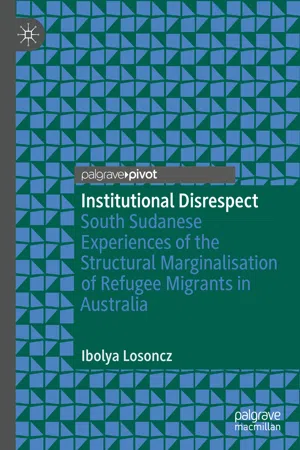Our relationship with social institutions is a key issue of our times. In Australia, public concern and protest have triggered an increasing number of royal commissions into various areas of conduct, including institutional responses to child sexual abuse; trade union governance and corruption; child protection and youth detention; misconduct in the banking, superannuation and financial services industry; and aged care quality and safety. Findings to date from these inquiries have confirmed our growing concern about how institutions and organisations in power have breached our trust and mistreated us—clients, customers, patrons, patients, members and humans, including minors, under their care. People have responded in various ways, from increased distrust of institutions to anger and disbelief. Central to these responses is a sense of institutional disrespect of ourselves as citizens and of the social contract underpinning our relationships with institutions.
This book hones in on one example of institutional disrespect: the disrespect experienced by refugee migrants in the context of settlement. The desire to be treated respectfully is not felt only by refugees. Respect is a basic principle of human interaction, and the foundation of many human connections. But refugees and refugee migrants are at a much higher risk of not receiving respect. So-called street racism and breaches of human respect against visible migrants are far too common. There is also another, less recognised, form of mistreatment of refugee migrants—institutional disrespect. Using a case study of recently settled South Sudanese Australians, this book tells previously untold stories of the breadth and depth of the sense of disrespect experienced by refugee migrants at the hands of the state and its institutions.
Since 1947, when the first group of refugees to be resettled arrived, Australia has accepted more than 750,000 refugees for resettlement (Neumann, 2016). For the last 15 years, Australia has resettled 13,750 humanitarian migrants each year.1 While the number of refugees being resettled in Australia per year has remained steady, the proportion of refugees from Africa, especially from Southern Sudan, increased markedly in the early 2000s. Between 2003 and 2007, approximately 20,000 South Sudanese refugees were accepted for resettlement in Australia (Lucas, Jamali, & Edgar, 2013). The South Sudanese community, while positive about the opportunity for resettlement in Australia, is facing a range of challenges. These challenges include the strong sense community members have of being disrespected (Colic-Peisker & Tilbury, 2007; Flanagan, 2007; Pittaway & Muli, 2009). There have been repeated calls from South Sudanese community leaders for a more respectful treatment of South Sudanese and other African immigrants. Social and human rights groups have endorsed these appeals (Australian Human Rights Commission, 2010). Issues about respect and lack of respect are also remarked on in the research literature exploring the settlement experiences of refugees, particularly those from Africa (Losoncz, 2011; Sang & Fielding, 2007). Yet this important topic lacks empirical analysis.
This book is an intellectual and empirical engagement with the issue of respectful treatment of South Sudanese and other refugee migrants. It considers the importance of respect in our interactions with such groups at an institutional level. It develops a theoretical understanding of institutional disrespect by examining the three main themes of disrespect identified by the South Sudanese community: their social and economic exclusion in the public sphere; state intervention in the private sphere of their families; and the unwillingness of the Australian Government to respond to the marginalisation of the community. Working across these domains, the book explains how failure by state institutions to acknowledge people’s identities and goals, and make pathways available for achieving those goals, leads to a sense of disrespect and social alienation among the very people these institutions are tasked with supporting.
The book posits that Australian governance arrangements are liable to create systemic disrespect towards refugee immigrants . To validate this claim, two main theoretical approaches are adopted: Robert Merton’s theory of modes of adaptation (Merton, 1968) and Val Braithwaite’s account of motivational posturing (Braithwaite, 2014). Merton’s theory is used to demonstrate how Australian public sector institutions fail to provide accessible pathways to support resettled refugees to achieve economic and social inclusion, security and wellbeing. The theory provides an analytical insight into why the South Sudanese community sees the state and its institutions as responsible for denying them the means of establishing themselves as equal to others in their settlement country. Building on this, Braithwaite’s motivational posturing theory explains how systemic barriers affect the identity reconstruction processes of resettled refugees. I demonstrate how blocked pathways to cultivating these immigrants’ moral, status-seeking and democratic collective selves can lead to defiance, and to a breakdown of social bonds between immigrants and the state and its institutions.
Aim, Focus and Contribution of the Book
The book makes both empirical and theoretical contributions. At the applied empirical level, the book uncovers the integration processes and experiences of South Sudanese refugee migrants through the lens of disrespect. Participants’ own understanding and construction of disrespect and its effects on their settlement efforts are analysed by focusing on what is going on in the minds of South Su...
